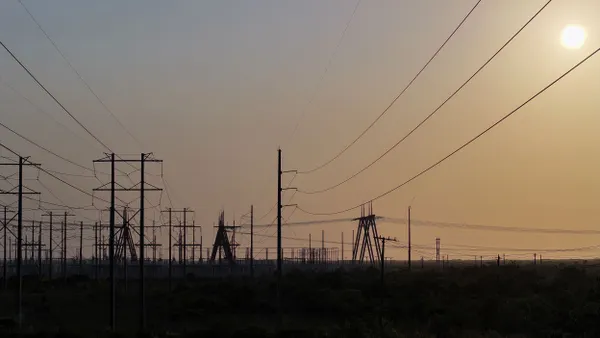Dive Brief:
-
The PJM Interconnection will not delay its August capacity market auction, CEO Andy Ott announced Wednesday, despite a lengthy delay in approving new rules for the market from the Federal Energy Regulatory Commission.
-
FERC invalidated PJM's current market rules last year but has not yet issued a decision on proposed changes. Ott said PJM will run the auction under current rules unless directed otherwise by FERC.
-
PJM last month warned FERC that it was nearing a number of deadlines to prepare for the auction and needed a decision soon. FERC regulators have repeatedly declined to comment on deliberations over rule changes, which force them to consider how state clean energy subsidies should be handled in wholesale markets.
Dive Insight:
PJM's decision to move forward with its capacity market auction this August reflects an extended impasse at FERC over how to handle renewable energy and nuclear subsidies put in place by states.
Last June, FERC threw out PJM's current rules because they allow subsidized resources to bid into the capacity market, lowering the clearing price for unsubsidized plants.
PJM responded with a two-pronged proposal in October to remove the subsidized resources from the market, and — if FERC assented — raise the clearing price for the remaining resources. The plan would institute a strict price floor, called the Minimum Offer Price Rule, for unsubsidized resources and allow the subsidized plants to operate outside the market.
FERC had urged PJM to devise its proposal quickly so as not to delay its 2019 capacity market auction, which has already been pushed back from an original scheduled date in May. The federal regulators, however, have been unable to find a majority to approve the rules or turn them back yet again.
Last month, PJM warned that delay could force it to postpone the auction once again. At the time, PJM said it informed market participants that "existing capacity market rules could still be regarded effective" — an argument it reiterated in its Wednesday filing at FERC
"Simply, without a replacement rate, or any order of the Commission otherwise, as demonstrated below, applicable law directs that PJM to operate under the existing Tariff," the grid operator wrote. "PJM already has begun the pre-auction processes as those processes leading up to the auction require preparation and submittals beginning months in advance."
On April 16, participants must file exemption requests to PJM's Must Offer rules, as well as submit information about the Market Seller Offer Cap, which PJM has warned "under the proposed rules covers more resource types than the current rules."
Fossil fuel generators represented by the Electric Power Supply Association welcomed PJM's decision to hold the auction under current rules. But others, like nuclear operator Exelon, had argued for the grid operator to delay the auction because holding it under invalidated rules could make the results vulnerable to legal challenge.
If FERC does not direct PJM to delay the auction, it will be the first time the grid operator has held its capacity market auction under invalidated rules — a situation Ott admits could make the results legally questionable.
"There's a significant legal challenge to that because the rules have been found unjust and unreasonable," Ott told Utility Dive last month on an episode of the Electric Power Station podcast. "So we just wanted to point out to FERC that the uncertainty here is causing a problem."
When FERC will rule on the PJM proposal remains unclear. The five-member commission has had one vacancy since the death of Commissioner Kevin McIntyre in January, allowing Democrats to deadlock votes at 2-2.
In February, FERC regulators gave no indication of timing for the PJM case in a series of appearances at a state regulatory conference in Washington. Democrat Commissioner Richard Glick, however, called for a "new approach" to capacity markets in general.
"It's incredibly complex what's going on in PJM and we constantly get proposed changes not only to capacity markets but also to energy markets," Glick said, "and I just worry that we're making it a lot more complicated than it is and not necessarily producing the results."













